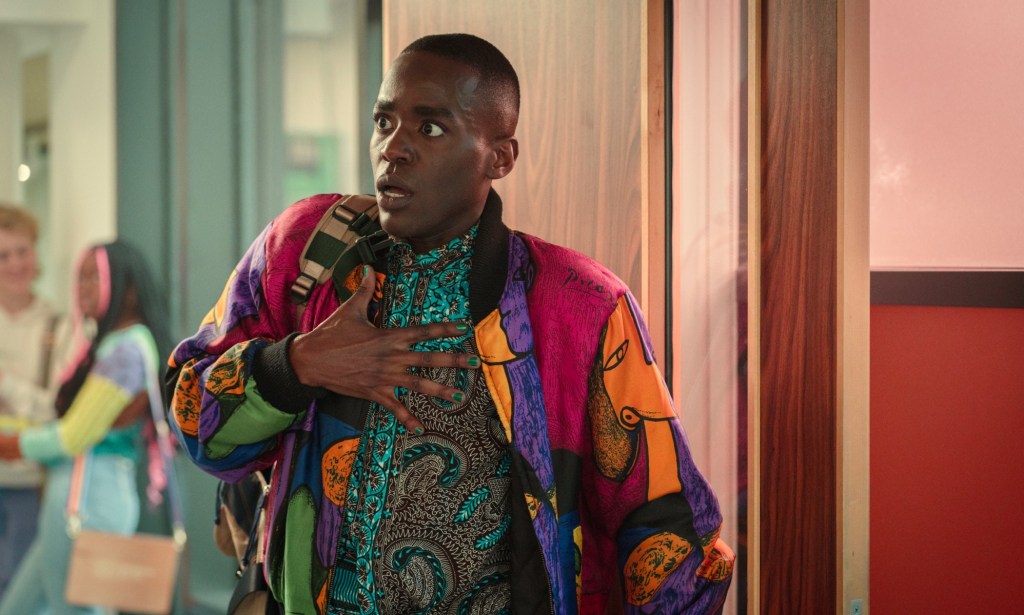Sex Education: Eric’s religious journey speaks to queer Muslims like me

Ncuti Gatwa as Eric Effiong in Sex Education season four. (Netflix)
In season four of Sex Education, Eric (played by Ncuti Gatwa) faces a crisis all too familiar for LGBTQ+ people from religious backgrounds: how to unite our queer identity with our faith, Asyia Iftikhar writes.
Eric Effiong‘s character arc in the final season of Netflix’s hit comedy-drama series is a breath of fresh air for me, as an LGBTQ+ Muslim.
The series follows Eric’s spiritual journey as he confronts the reality of religious intolerance towards the LGBTQ+ community. Supported by a mysterious God-like figure (played by Jodie Turner-Smith), Eric is able to embrace his faith on his own terms.
I saw myself in his struggle. Growing up in a conservative household inevitably led to a complicated relationship with my faith – and my queerness. For a long time, my life was guided by everything I couldn’t do: drink alcohol, eat pork, dress immodestly, speak to boys.
And for several years, my days were marked by Islamic study classes, the erasure of queer people and hiding who I was. By the time I finished school – unsure whether my inner truth lined up with what I had been taught between mosque walls – my relationship with the faith had been undeniably shaken.
In 2019, during the No Outsiders protests – demonstrations by Muslim parents against an LGBTQ+-inclusive school curriculum – I had never felt so far removed from the community I had grown up in.
So, when Ncuti Gatwa‘s Eric embarks on the path to his baptism, afraid of what he’ll find, my heart constricted in sympathy. In adulthood, I have spent years unlearning the restrictions that shaped my adolescence and overcoming the dose of religious guilt that comes with unapologetically being myself.
As I heal, I find myself wondering how to nurture my relationship with faith in a way that doesn’t force me to compromise on my values. A 2018 Stonewall report revealed that this experience is widespread, with an average of only two in every five LGBTQ+ people of faith believing their community is welcoming.

Often, it is easy to paint this religious conflict as black-and-white. Countless TV shows and films show LGBTQ+ people dramatically exiled from their religious communities, present queerness and faith as diametrically opposed, or portray a tortured individual trapped in a life over which they have no control.
While these experiences can, and do, occur all too often, Eric’s story offers a more-rarely seen portrait of spirituality, where he turns his back on bigotry, to carve his own, resolute route forward.
In the final episode, there is a powerful moment where he offers the church congregation a choice: to support him or remain stuck in their homophobic rut. It is only his mother who stands up.
After this show of defiance, he bumps into Turner-Smith’s character, who shares a powerful monologue that has moved fans carrying religious trauma to tears.
“You will change hearts and minds,” she tells a heartbroken Eric, “and let everyone know that I love them for who they are.” It’s this speech that spurs him towards making a decision to become a pastor.
While I don’t believe it should ever be the task of an oppressed community to shoulder the burden of educating others, there is value in becoming a beacon of hope for those who need it.
In that moment, I thought of the LGBTQ+ Muslims I know who have told me their identity in whispered conversations, tinged with fear, or in university halls miles away from home.
There are scenes during the series that are perhaps too idealistic. For example, in the final episode, Eric’s local pastor arrives to apologise and promises to start changing the culture within his church.
However, seeing a happy ending for a much-loved gay character who has struggled to reconcile his faith with his identity offers a spark of hope to vulnerable young people who may be feeling lost and alone.
Not everyone will start an intra-faith movement for LGBTQ+ acceptance, but Eric’s fortitude in the face of rejection reminded me of the most important thing: I am only the person on Earth who gets to decide how, and when, I exercise my faith.

